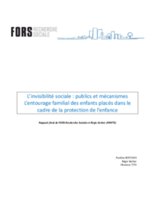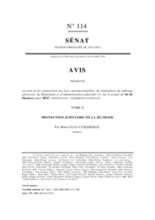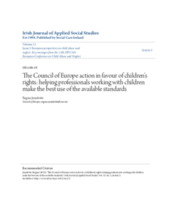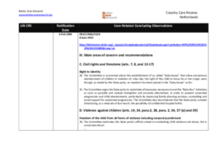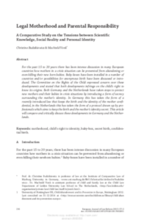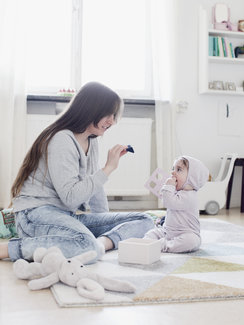

Displaying 321 - 330 of 424
La question spécifique de l’entourage familial des enfants placés dans le cadre de la protection de l’enfance apparaît tout particulièrement complexe et intéressante. Les questions relatives aux trajectoires individuelles des membres de l’entourage familial des enfants placés dans le cadre de la protection de l’enfance sont rarement pas analysées et méritent une attention particulière.
25 experts ont accepté de partager le fruit de leur réflexion afin de questionner l’effectivité des droits des enfants en France, en 2015. La seule réflexion qui doit guider pouvoirs publics comme société civile est finalement bien celle qui conduit à mesurer les écarts entre les droits formels et les droits réels des enfants
La commission des lois du Sénat francais a examiné les crédits du programme « protection judiciaire de la jeunesse » du projet de loi de finances pour 2015. La rapporteure s’est penchée sur deux sujets liés à la protection judiciaire de la jeunesse qui ont connu récemment des développements importants : d’une part, la question difficile de la prise en charge des mineurs isolés étrangers, d’autre part celle des placements en famille d’accueil.
In this video from the BBC, Clive Myrie reports from Ethiopia, the first stop for many Eritrean migrants en route to Europe. The video features a few of these child migrants who are waiting in Ethiopia to make their way to Europe in hopes of a better life.
In this study 59 children between 10 and 18 years placed in long term foster care in the Netherlands completed standardized questionnaires on the relationship with their parents respectively foster parents and their wellbeing.
The 7th Milestones of a Global Campaign for Violence Prevention Meeting - hosted by the World Health Organization (WHO) at its Executive Boardroom in Geneva, Switzerland - will focus on child maltreatment and youth violence, among other topics.
This article describes the current strategies of the “Building a Europe for and with Children” programme, a programme of the Council of Europe. The strategy focuses on four areas of action: promoting child-friendly services and systems; eliminating all forms of violence against children; guaranteeing the rights of children in vulnerable situations, and promoting child participation. A further standard is available on children’s rights and social services friendly to children and families for ensuring that children lacking or placed outside parental care are given adequate treatment.
This country care review includes the care related Concluding Observations adopted by the Committee on the Rights of the Child.
This article explores the use of baby boxes in Germany and the Netherlands.
In this speech delivered at the 9th European Forum on the Rights of the Child in Brussels, Věra Jourová, EU Commissioner for Justice, Consumers and Gender Equality highlights the current dangers faced by many of Europe’s children today, including poverty and institutionalization.

